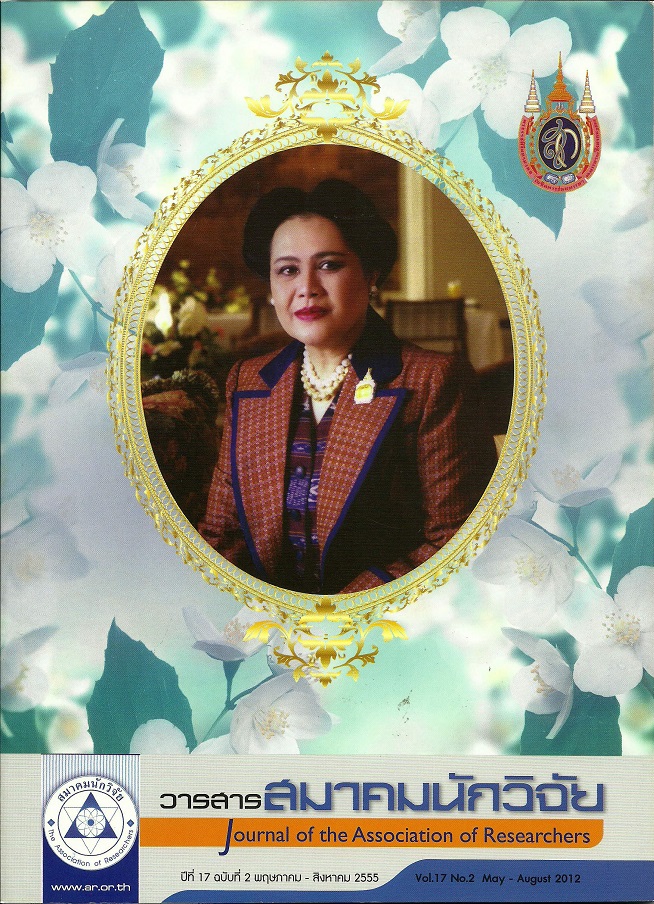THE EFFECTS OF ATTITUDE IN ACCORDANCE WITH THE PHILOSOPHY OF SUFFICIENCY ECONOMY UPON THE SUCCESS OF EMPLOYEES WORK PERFORMANCE
Main Article Content
Abstract
The purpose of this study was to verify the effects of attitude in accordance with the Philosophy of Sufficiency Economy upon the success of employees' work performance. A questionnaire was constructed to collect data from 193 samples selected by means of convenience sampling. The statistics used for the data analyses were t-test, F-test, or analysis of variance (ANOVA and MANOVA), and multiple regression correlations analysis. The attitude in accordance with the Philosophy of Sufficiency Economy was the independent variable affecting the success of employees' work performance. The results showed the following: 1) the attitude in accordance with the Philosophy of Sufficiency Economy in the aspects of self immunity, morality and ethics had positive relationships with and effects on the success of work as a whole; 2) the attitude in accordance with the Philosophy of Sufficiency Economy in the aspects of self immunity had positive relationships with and effects on the success of work on the provision and resource utilization ; 3) the attitude in accordance with the Philosophy of Sufficiency Economy in the aspects of reasonableness, self immunity, morality and ethics had positive relationships with and effects on the success of work on the operational process; 4) the attitude in accordance with the Philosophy of Sufficiency Economy in the aspects of self immunity, morality and ethics had positive relationships with and effects on the success of work on the participants' satisfaction. Therefore, the Siam Cement Group and other businesses should apply the information obtained from the study for policy formation, organization's goal, and levels of planning in the organization. The results of the study should be improved, developed, enhanced, and pushed the employees to have an attitude in accordance with the Philosophy of Sufficiency Economy for the success of work, the ability to run a business, and the ability to compete sustainably.
Article Details
บทความที่ปรากฏในวารสารนี้ เป็นความรับผิดชอบของผู้เขียน ซึ่งสมาคมนักวิจัยไม่จำเป็นต้องเห็นด้วยเสมอไป การนำเสนอผลงานวิจัยและบทความในวารสารนี้ไปเผยแพร่สามารถกระทำได้ โดยระบุแหล่งอ้างอิงจาก "วารสารสมาคมนักวิจัย"
References
ดุจเดือน พันธุมนาวิน และ ดวงเดือน พันธุมนาวิน. (2550). หลักเศรษฐกิจพอเพียงในระดับบุคคล : ทฤษฎีและผลการวิจัยเพื่อสร้างดัชนีในแนวจิตพฤติกรรมศาสตร์, พัฒนบริหารศาสตร์, 47 (1/2550), 27-28.
ทองทิพภา วิริยะพันธุ์. (2550). เศรษฐกิจพอเพียง: ความพอเพียงมวลรวมในประเทศไทย. กรุงเทพฯ: ดวงกมลสมัย.
บริษัท ปูนซิเมนต์ไทย จํากัด (มหาชน) (2553). คุณและเพื่อนกับการประหยัดพลังงานในออฟฟิศ. ค้นเมื่อ 1 เมษายน 2553, จาก
ประจักษ์ บัวผัน (2553). หลักการบริหารสาธารณสุข. (พิมพ์ครั้งที่ 2), ขอนแก่น: โรงพิมพ์ มหาวิทยาลัยขอนแก่น
พันธุ์บุณย์ ทองสังข์. (2549), หลักปรัชญาเศรษฐกิจพอเพียงกับกลยุทธ์การจัดการองค์การในสภาวะวิกฤต กรณีศึกษา: ชุมพร คาบาน่ารีสอร์ท. สารนิพนธ์ วท.ม. (การพัฒนาทรัพยากรมนุษย์และองค์การ) กรุงเทพฯ: สถาบันบัณฑิตพัฒนบริหารศาสตร์
พิภพ วซังเงิน. (2547). พฤติกรรมองค์การ. (พิมพ์ครั้งที่ 1). กรุงเทพฯ: อักษรพิทยา
ยงยุทธ เกษสาคร. (2548). การวางแผนและนโยบายทางด้านทรัพยากรมนุษย์ (พิมพ์ครั้งที่ 5) กรุงเทพฯ: ศูนย์หนังสือมหาวิทยาลัยราชภัฏสวนดุสิต
รังสรรค์ ประเสริฐศรี. (2548). พฤติกรรมองค์การ. กรุงเทพฯ: ธรรมสาร. วัลลภ ลําพาย. (2551). เทคนิควิจัยทางสังคมศาสตร์, กรุงเทพฯ: มหาวิทยาลัยเกษตรศาสตร์
วิสูตร สุจิระกุล. (2551). การบริหารงานตามหลักปรัชญาเศรษฐกิจพอเพียงของบริษัทปูนซิเมนต์ ไทยจํากัด (มหาชน), วิทยานิพนธ์ บธ.ม. กรุงเทพฯ: มหาวิทยาลัยรามคําแหง
สมใจ ลักษณะ. (2543). การพัฒนาประสิทธิภาพการทํางาน. กรุงเทพฯ: คณะวิทยาการจัดการ สถาบันราชภัฏสวนสุนันทา สมบูรณ์ บุญโฉม. (2552). ปัจจัยจิตสังคมที่ทํานายพฤติกรรมด้านเศรษฐกิจพอเพียงของสมาชิก กลุ่มออมทรัพย์เพื่อการผลิต อําเภอสบเมย จังหวัดแม่ฮ่องสอน. รายงานการ ค้นคว้าแบบอิสระ วท.ม. (จิตวิทยาการปรึกษา), เชียงใหม่: มหาวิทยาลัยเชียงใหม่
สมพร เทพสิทธา. (2550). การดําเนินชีวิตแบบเศรษฐกิจพอเพียง ซูมซนและแนวคิดเศรษฐกิจ พอเพียงปรัชญาเศรษฐกิจพอเพียงในบริบทของศาสนาและวัฒนธรรม กรุงเทพฯ: สมชายการพิมพ์
สุขสรรค์ กันตะบุตร. (2550). การศึกษาการประยุกต์ใช้ปรัชญาของเศรษฐกิจพอเพียงในภาคธุรกิจ ค้นเมื่อ 3 พฤษภาคม, 2553, จาก
ศูนย์ศึกษาเศรษฐกิจพอเพียง. (2551). ปรัชญาของเศรษฐกิจพอเพียงกับการบริหารการพัฒนา กรุงเทพฯ: ศูนย์ศึกษาเศรษฐกิจพอเพียง สถาบันบัณฑิตพัฒนบริหารศาสตร์
หทัยรัตน์ อยู่รอด. (2550). ทัศนะของพนักงานต่อการนําแนวคิดปรัชญาเศรษฐกิจพอเพียงไปใช้ในการ ดําเนินชีวิต กรณีศึกษา: บริษัทโจนส์ แลง ลาซาลล์ (ประเทศไทย) จํากัด. ภาคนิพนธ์ ศศ.ม. (พัฒนาสังคม), กรุงเทพฯ:
สถาบันบัณฑิตพัฒนบริหารศาสตร์, อัครวรรธน์ รอดสมบุญ. (2551). การสื่อสารการตลาดของธุรกิจที่ดําเนินการตามแนวคิดปรัชญา เศรษฐกิจพอเพียง กรณีศึกษา: ชุมพร คาบาน่ารีสอร์ท และคําแสดุริเวอร์แคว รีสอร์ท. วิทยานิพนธ์ นศ.ม. (นิเทศศาสตร์การตลาด), กรุงเทพฯ: มหาวิทยาลัย หอการค้าไทย
Aaker, D. A., Kumar, V., Day, G. S., & Leone, R. P. (2011). Marketing Research. 10"hed. Asia: John Wiley and Sons (Asia).
Black, K. (2006). Business Statistics for Contemporary Decision Making. 4thed. USA: John Wiley and Sons.
Kirchmeyer, C. (2002). "Determinants of Managerial Career Success: Evidence and Explanation of Male /Female Differences." Journal of Management. 24(6), 673-692.


